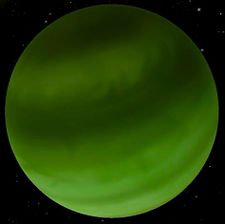Tutorial:How to get to Jool
Contents
- 1 Traveling to Jool
- 2 Steps
- 3 Ideas
Traveling to Jool
Jool is the second most distant body in the Kerbol system, and one of the more time-consuming locations to reach. Getting to Jool is really the next step after Eve and Duna, and is an attractive target due to its large atmosphere and complex moon system.
Specifications
- Length: 1–3 hours
- Difficulty: Hard
- For version: .17
Additionally, you will need a good understanding of orbital mechanics (see Tutorials section), angles, and a lot of patience.
Steps
Step 1 - Build Your Rocket
The rocket should be a large ship with different things to land on all 5 moons docked to it in kerbin orbit
Upper Stage
Huge rocket with at least 2 rockomax jumbo fuel tanks and then capacity for all the crew that will dock to your ship
Middle Stage
To circularize orbit and start kerbin escape
Lower Stage
Massive launcher. Should be capable of carrying the rocket to orbit
Step 2 - Planetary Alignment
The alignment for a very efficient transfer is jool is slightly ahead of kerbin. You should escape kerbin with the orbit direction of jool as it will save you much fuel and troubles later when you arrive
Step 3 - Launch to Kerbin Orbit
You should first launch your main ship into orbit and then dock different landing modules to it in orbit
Step 4 - Fly from Kerbin to Jool
Make a maneuver node that is prograde and when you get a jool encounter burn to complete the maneuver
Step 5 - Arriving at Jool
When you arrive at jool you have 3 options: 1) aerobrake If possible I recommend using laythe and not jool due to jools thick atmosphere which is more prone to overheating your ship than laythe. Put your periapsis at 15km and also I suggest using several Klaw-heat shield modules which have probe cores and RCS to dock to your engines temporarily to protect them from exploding. 2)tylo Gravity assist Read the gravity assist page for detailed instructions on a RETROGRADE a gravity assist. 3) burn fuel The crude and fuel wasting method but is easier to perform. Just burn retrograde when you are at your jool periapsis.
After circulation
You should put your orbit in a moon unaffected region
Step 6 - Traveling to its moons
One by one you should deploy landers to go to each of the moons and do lots of science.
on the moons
When you have landed on each moon make sure you take and store all the data in your command pod as this will make your life easier in space. Then take off into jool orbit
docking back together
Dock ALL the landing devices back together to the main ship. transfer all fuel, electricity, xenon, ore and Monopropellant to the main ship and have your kerbals go on EVA and take the data and jet pack to your main ship crew quarters(I do know that crew transfer exists but this is for science purpose)and make sure no science or resources are stored on board the landing devices and then undock all of them or risk not getting to kerbin by taking them with you.
the return
Make sure kerbin is behind jool and now escape jool and then burn what you need to burn to make your periapsis one the orbit of kerbin and you should get an encounter. Put your periapsis at 30-20km and swiftly get rid of any engines or fuel tanks and start the re-entry procedure.
Final Word
You have successfully done a mission to the joolean system and now you have explored most of the kerbol system and now you can build bases, send rovers and more to the planets of kerbal space program. Have fun!
Ideas
Re do the Galileo probe entry to Jupiter
Try a low mass Jool ship using Ion engines.
